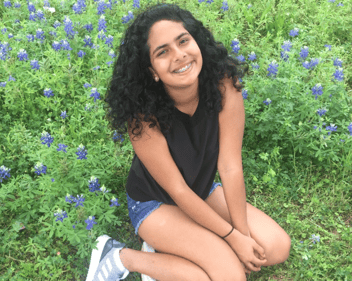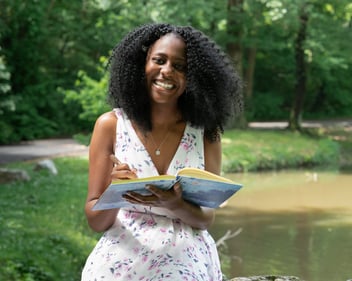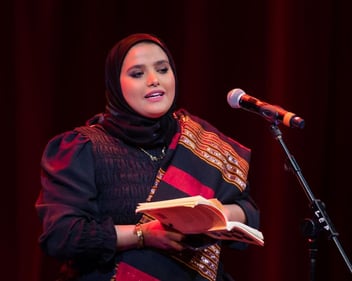In 2017, Los Angeles native Amanda Gorman was awarded the prestigious honor of becoming the United States’ first Youth Poet Laureate. This distinction has given Amanda the opportunity to not only share her art with the world, but to bring poetry to places and institutions where it had not held space before. We recently sat down with Amanda to discuss everything from her personal writing process, to how speaking with an impediment has been a motivating factor in perfecting her craft. In our interview with Amanda, she offers invaluable advice on finding the strength to conquer your fears and tips on how to get your work out to a wider audience. Amanda, who is judging this month’s Poetry and Spoken Word Competition, also shares what she’s looking for in a winning poem and winning performance. Read on to be utterly inspired.

Write the World: We hear a lot of our young writers talk about not having enough time to write as often as they’d like to. Between being a poet, an activist, and keeping up with your studies at Harvard University, you are quite busy yourself. Do you have any time management tips for young writers struggling to find the time to put pen to paper?
Amanda: That’s a really interesting question because I, in particular, do not know the “end all, be all” rule for time management and writing, and in many ways that’s still something that I struggle with on a daily basis. But what I always remind myself to do, is to be committed to carving out time each day to write, no matter what might come out—it could even be the alphabet! That might look different for different types of writers and different types of artists. For me, I usually try to write for at least 15 minutes a day, or about 300 words a day. The point is, is to be very dedicated to sculpting out some measure of time. Being a great writer isn’t necessarily about natural skill, it’s about practice and perseverance.
Write the World: Can you tell us a bit about your own writing process? For example, if you’re writing a poem, what does the evolution of the piece look like over time? Do you have a writing and editing process that you adhere to?
Amanda: I have a very habitual process for creating the actual work. Editing looks a bit different. When I write a piece for the first time, I have to listen to music. I’m really grounded in music, lyricism, and rhythm so that’s something critical that I need in order to inspire me as I create. I’ll play my favorite playlist of instrumental music because I can’t write to music that has words in it, or I’ll start writing those exact words down. I have different songs and different playlists depending on where I am and what I’m writing. If I’m brainstorming, I’ll listen to more dramatic, instrumental music that has a kind of climax. If I’m trying to string the right words together during the editing process, I’ll change what I’m listening to.
I think that a lot of it is about knowing what environment works best for you—I think that looks different for everybody. For me, and I think this might be coming from California as well, if I can get as much natural light in my environment while I’m creating, that really helps ignite my thoughts. Whether it’s moonlight or sunlight, natural light really gets me going. So I make sure not to hole away in a closet. To be specific, you should recognize what environment, what triggers, and what conditions help you mobilize that [creative] aspect of yourself the best.
Write the World: That’s fantastic advice. For this competition, in addition to writing a poem, students have the option to submit an audio or video clip of themselves performing their poem. What was it like performing your poetry for the first time and how has that experience changed as you continue to perform?
Amanda: The first time I performed, I might have been in ninth grade, barely past puberty, and I remember being so nervous to get on stage. I talk a lot about how that nervousness comes from having a speech impediment. Performing is more difficult for me, perhaps, than someone without a speech impediment. I’m not just worried about the content of what I say, and whether it’s actually powerful, but I’m also worried about if I can actually say it. And so I push myself to go out and perform. To anyone entering the competition, I would suggest that you send in your videos, send in your writing, and just go for it and don’t hold yourself back.
Write the World: You touched on something important. In the past, students have expressed worry about performing their work because they dislike the sound of their voice, or they have differences in their speech pattern. So, it’s great for young writers to hear your advice to “just go for it.”
Amanda: Yeah! I realize that it’s not just a ‘thing’ with a speech impediment, it’s also a ‘thing’ if you’re an immigrant, or have an accent, or maybe you don’t feel like your dialect is represented. Everybody comes to the stage with their own baggage. But I also think that diversity is what makes it perfect, so there’s not one single type of performance.
Write the World: In 2017, you were honored with the distinction of Youth Poet Laureate. As a result, you’ve been featured on a number of television programs, including MTV’s TRL. What’s it like to connect with media outlets that don’t necessarily cater to the poetry community? What does that mean for you and your work?
Amanda: I definitely knew, when I was a National Youth Poet Laureate, that I wanted to bring that platform to spaces that people hadn’t traditionally thought of in terms of youth poetry. And I thought that if I could break down those barriers, and open those doors, then that would be the crest of the historical work that I was attempting to build.
Early on in my tenure, during the fall of 2017, I was able to introduce Tracy K. Smith, who is the adult poet laureate, at her Congress reading. I thought that was a great moment because the library hadn’t had a youth poet open for an adult laureate before. So, it was the first time where we had this national institution being motivated and inspired to work with a young poet. And now, other finalists for the Youth Poet Laureate have been able to go there and perform poetry.
I performed at the United Nations Social Good Summit. When people show up to a conference like that (where they’re talking about global issues), I don’t think they expect to see a young, skinny black girl on stage performing a poem. But that moment was thrilling for me because I’m like, “I’m not only going to show you that poetry does fit into this context, but how this agenda is able to progress even more so because of poetry and young voices being welcomed in this space.
Write the World: So it’s not just that you’ve been given all these opportunities,you’re also opening up opportunities for institutions and organizations too.
Who are some artists that are inspiring you at the moment?
Amanda: I always mention how I’ll sound cliché if I talk about Maya Angelou, but I definitely look to Maya Angelou because not only is she a great poet, but what she did, and how she moved through the world, made her a great human being. So I try to model my own principles as a Poet Laureate on those of Maya Angelou as well as Gwendolyn Brooks. Gwendolyn Brooks was an adult Poet Laureate, and I think of her as the Poet Laureate of the people because she made herself available and accessible to anyone who had questions about poetry, and she didn’t hold back any of her blackness or femininity in that role—I’m really motivated by that. As for young people, she’s not a poet, but Hunter Schafer is a transgender model and visual artist and I love the work that she does.
I also love Kimothy Joy who is a watercolor artist I’ve been following for a while. We finally got together and she ended up creating paintings based off a poem that I wrote.
Write the World: For many of the young writers on our site, their goal in life is to become a published author. Do you have any advice on how they can work toward achieving that goal? What are some of your own writing goals and how have they evolved over time since you started writing?
Amanda: I just want to say one thing: there is no such thing as an aspiring writer, there are just writers. You didn’t use the world “aspiring” but I mention it because many young writers think that in order to be a writer, you have to have your work published in X, Y, and Z locations. That’s not what it means to be a writer; it’s a continuous journey that occurs before and after publication.
As for publishing, I think young writers are really fortunate today because of the internet. There’s a lot of opportunities to get some writing out there and make it accessible. You can start by publishing your own writing on your own blog, or your Instagram or Tumblr. But there’s also a wide variety of publications online that are always looking for student work. I got started writing a few pieces for the Huffington Post, mariashriver.com, and HelloGiggles. It’s about being able to roll up my sleeves and do the research about what platforms are out there, what platforms would be the best spaces for my work and giving my all.
Write the World: Recently, in light of today’s increasingly polarized political climate, the world has witnessed a huge increase in social and political engagement from young people. Why, in your opinion, is it so vital for young people to speak out and have their voices heard?
Amanda: I think young people recognizing their own power is so important because when you think about it, we’re the ones who have the most at stake. We’re the ones who are inheriting the world that has been created and we can either take it as it is, or make a difference and create a world that we want to live in and one we want to pass on to future generations.
Write the World: For this month’s Poetry and Spoken Word Competition, what are you looking for in a winning poem and in a winning performance of a poem?
Amanda: I’m looking for writing that is new and that is bold and that might even challenge my definition of what poetry can do. I want to see entrants have the courage to find something new and to try something bold and innovative.
Write the World: And finally, the most important question: If you could insert yourself in any fictional world or be any character for a day, who would it be and why?
Amanda: Oh, wow! That’s difficult because most of the fictional worlds that I want to be in have a lot of problems. I’d get there and I’d be like, “take me back!” But I’d say I’d want to be Hermione Granger for a day because I love her and I think she’s amazing and she was my strong female character figure while growing up. But also being at Hogwarts on a chill day, without the craziness of Death Eaters and Voldemort, would be great.





